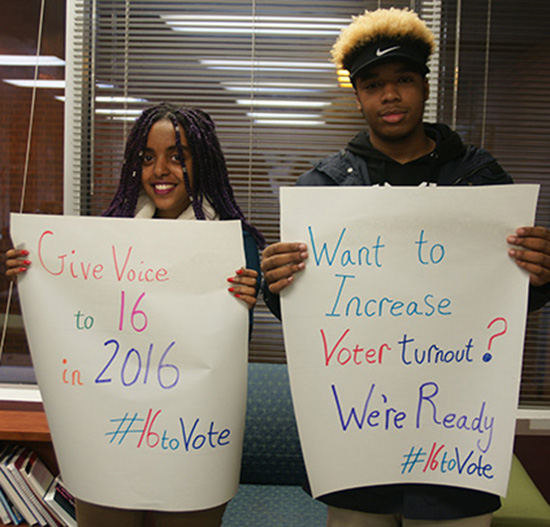
YWP has moved several foster care, health, and educational policies in the past five years that have significantly expanded rights and opportunities for DC youth. For example, The Foster Youth Transit Subsidy will extend the $30 DCPS monthly student transportation card to 400 foster youth ages 19 and 20 starting October 1, 2013; The Foster Youth Rights and Responsibilities Amendment Act of 2012 was signed into law on January 22, 2013, which details 40 rights in education, privacy, health, transportation, and other issues. On the health end, we expanded the DC Public Schools Condom Distribution Act to include youth, and then we advocated for funding to hire youth as peer educators and developed new Health Education Standards (the most far-reaching and youth needs responsive in the country), which should be passed by the State Board of Education in April 2016 and implemented in September 2017.
YWP has moved several child welfare, health, and educational policies in the past five years that have significantly expanded rights and opportunities for DC youth, as follows:
Led the development and passage of new DC State Learning Standards for Health Education (Approved 4.1.16 for a 8.16 implementation), working closely with the State Board of Education, DC Public Schools (DCPS), and the Office of the State Superintendent of Education (OSSE). Specifying concepts and skills that students need to know and do, from pre-K through 12th grade, standards are used to develop curriculum and professional development, inform teacher lesson plans and instruction, and monitor student progress. Driven by the urgent health needs of DC children and youth and shaped by the instructional needs of public school teachers, these new standards are likely to be the most comprehensive, progressive, skills-based, and needs responsive in the country. Now we are working to support and fund health standards implementation.
Led the development and passage of The Youth Rights and Responsibilities Amendment Act of 2012, signed into law on 1.22.13, which provides more than 40 rights in education, privacy, health, transportation, and other issues to DC foster youth. Include link
Led the development and passage of The Foster Youth Transit Subsidy which will extend the $30 DCPS monthly student transportation card to 400 foster youth ages 19 and 20 starting October 1, 2013; Include link
Led the development and passage of internal CFSA policies that established a $1,464 a year clothing voucher system for youth in care, a $100 monthly mandatory allowance, and an increase the independent living stipend for youth in care starting November 2013. Include link
- DCPS condom availability policy in 2011, to include youth condom distributors and the expansion of WRAP-MC to include youth leaders and trainers; Include link
Organized Yes Youth Can: Confronting the Challenges of Aging Out (1.22.09), a youth-led hearing held by the Committee on Human Service chair CM Tommy Wells. Featuring more than 25 witnesses, the hearing examined the experiences and challenges of older youth in education, employment, and emancipation. “I’d like to acknowledge the Young Women's Project and how effective they are at having youth take part in their government and to really make changes,” said Chairman Tommy Wells. “ It’s certainly a model. I don’t think we’ve had a better hearing.” Include link
Led the development and passage of the DCPS Student Sexual Harassment Policy (7.2002): After two years of research, surveys, building support among teen women – SCSS wrote and passed a DCPS Sexual Harassment Policy 7.2002 Include link and took the lead on implementation. Sexual Harassment Campaign (SHC) staff created a user-friendly version of the policy which was distributed to all DCPS teachers and administration during September 02 orientations. SHC youth and adult staff worked together to train 1,500 students in three schools, train 50 go-to staff and 200 student leaders from 12 DC public high schools and 9 middle schools (10.03), and developed The Harassment Education Package (HEP) which provides tools (lesson plans, recruitment advice, evaluation tools, policy information) to go-to teachers and students so that they can conduct sexual harassment training and track policy implementation. YWP staff facilitated the DCPS Sexual Harassment Taskforce, including youth-serving non-profits, the Office for Civil Rights, the DC PTA and officials from the Superintendent’s Office – charged with implementing the policy. Include link
Released two youth-created Handbooks, Taking Matters into Your Own Hands (3.09) and How to Deal with the System: Important Information that Will Help You (6.06). Both publications provide more than 200 pages of essential information on rights, regulations, and how to navigate the system – including articles, resource pieces, and personal stories on the court system, social workers, monitors, group homes, judges, educational and vocational opportunities, laws, and more. The Handbooks were distributed – via paper, email, and website – to 1000s of youth in care, CFSA staff, GALS, child advocacy groups, families, and others. Include link
In 2001, working with the Office of the Deputy Mayor for Children, Youth, and Families – we helped develop and advocate for the passage of regulations for group homes (Chapter 24) and independent living program contractors (Chapter 26). These regulations provided first ever guidelines for congregate care conduct and monitoring, increased the quality of care for youth residents, and established youth rights in several key areas. Since 2003, YWP has monitored the quality of services in group homes and ILPs through surveys, workshops, and individual youth testimonials and report progress to City Council as part of the annual CFSA oversight hearing.


